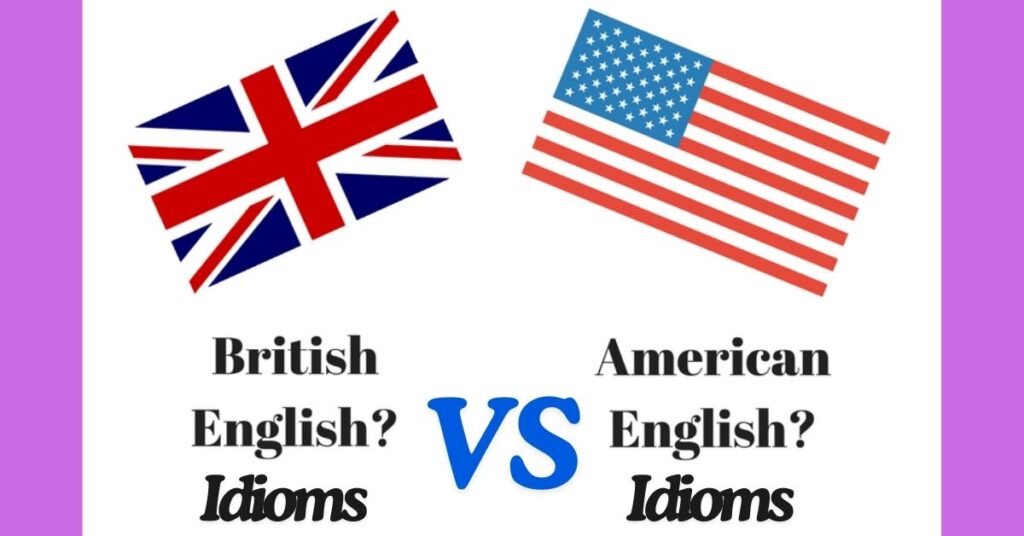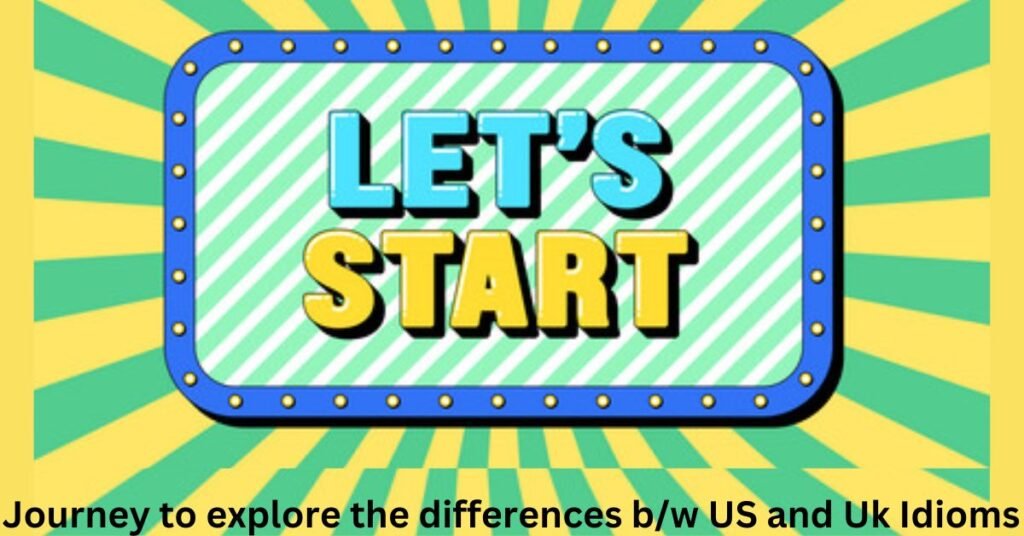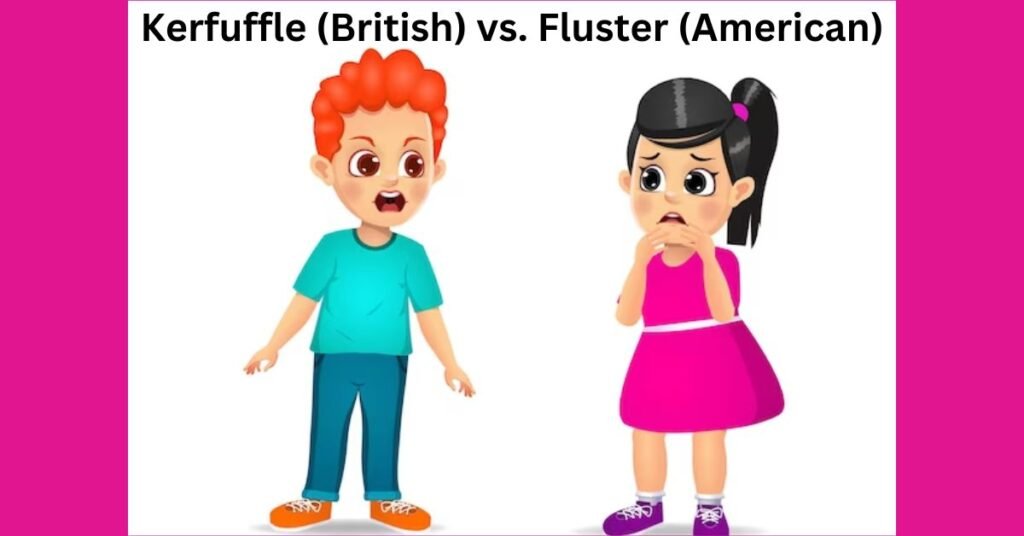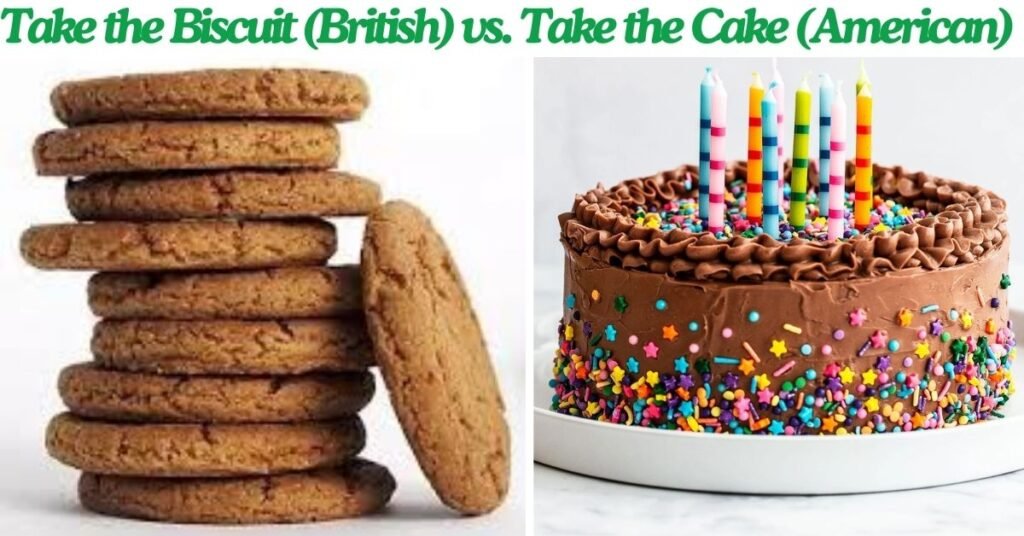Difference between British and American Idioms
The reasons behind these differences are rooted in history and geography. Separated by the vast Atlantic Ocean, American and British English evolved along separate paths, picking up unique vocabulary and expressions along the way. Furthermore, regional influences within both the US and the UK added even more flavor to the rich stew of idioms we have today. Understanding these nuances can make you a more confident communicator, allowing you to navigate the sometimes confusing world of English across the pond. So, buckle up and get ready to explore the fascinating world of American and British idioms!

While both American and British idioms use figurative language to convey a meaning that goes deeper than the individual words, there are some key distinctions between them. Some idioms share the same basic idea but use different words to paint the picture. For instance, in the US, you might “put in your two cents” to share your opinion, while across the pond, a Brit might offer their “two pennyworths.” However, things can get trickier when the idioms themselves are completely different. Americans might “knock on wood,” while their British counterparts might prefer to “touch wood.” These variations can lead to some head-scratching moments, especially for those encountering these expressions for the first time.
The reasons behind these differences are rooted in history and geography. Separated by the vast Atlantic Ocean, American and British English evolved along separate paths, picking up unique vocabulary and expressions along the way. Furthermore, regional influences within both the US and the UK added even more flavor to the rich stew of idioms we have today.
Feeling stuck? Like you’re spinning your wheels and getting nowhere? We’ve all been there. But here’s the secret: even the most impressive achievements started with a single, uncertain step. Don’t let doubt hold you back. See challenges as stepping stones, not roadblocks. Each misstep is a chance to learn and adjust. So take a deep breath, acknowledge your progress so far, and keep moving forward. Remember, the most awe-inspiring journeys often begin with a single brave step. You’ve got this!

Kick the Bucket (American) vs. Peg Out (British)
Sentence Examples:
American: “Grandpa was old and frail, everyone knew he’d kick the bucket soon.”
British: “The poor bird seemed like it would peg out any minute.”
Use: When discussing death in a casual or empathetic way.
Spill the Beans (American) vs. Blow the Gaff (British)
Meaning: To reveal a secret
Sentence Examples:
American: “If you spill the beans about the surprise party, it’ll be ruined!”
British: “Don’t blow the gaff about the boss’s birthday gift, it’s a surprise!”
Use: When someone accidentally or intentionally reveals something confidential.
Rubbish (British) vs. Trash (American)
Meaning: Garbage, unwanted things
Sentence Examples:
British: “Take out the rubbish before dinner, love.”
American: “Gotta take out the trash before the raccoons get to it.”
Use: When referring to things you intend to discard. (Note: Rubbish can also mean nonsense in British English.)

On Holiday (British) vs. On Vacation (American)
Meaning: Time off for leisure
Sentence Examples:
British: “I’m going on holiday to Greece next month.”
American: “We’re taking a vacation to Hawaii in July.”
Use: When referring to a period of relaxation and travel.
Quite Fancy (British) vs. Kind Of Like (American)
Meaning: To mildly like something
Sentence Examples:
British: “I quite fancy a cup of tea after that long walk.”
American: “I kind of like the blue shirt better than the green one.”
Use: When expressing a casual preference for something.
Kerfuffle (British) vs. Fluster (American)
Meaning: To become flustered, confused, or slightly annoyed.
Sentence Examples:
British: “The last-minute changes caused a bit of a kerfuffle at the airport.”
American: “All the questions during the presentation left me feeling flustered.”
Use: When someone is momentarily stressed or confused due to a situation.

Chip In (American) vs. Muck In (British)
Meaning: To contribute or help with something.
Sentence Examples:
American: “Everyone chipped in to buy a birthday gift for Sarah.”
British: “Let’s all muck in and get these decorations up before the party.”
Use: When offering or asking for help with a shared task.
Take the Mickey (British) vs. Poke Fun (American)
Meaning: To tease someone in a playful way.
Sentence Examples:
British: “Don’t mind John, he’s just taking the mickey out of your new haircut.”
American: “The kids were just poking fun at each other during recess.”
Use: When someone is playfully teasing another person, but not trying to be mean.
Quite a Performance (British) vs. Put on a Show (American)
Meaning: To act dramatically or behave in a way to attract attention.
Sentence Examples:
British: “The toddler threw quite a performance when it was time to leave the playground.”
American: “The singer really put on a show during the concert.”
Use: When someone is acting dramatically or theatrically.

A Spanner in the Works (British) vs. A Monkey Wrench in the Works (American)
Meaning: An unexpected obstacle or problem that disrupts a plan.
Sentence Examples:
British: “The car breaking down threw a spanner in the works for our weekend trip.”
American: “The missing ingredient turned out to be a monkey wrench in the works for our dinner plans.”
Use: When something unexpected hinders or delays a plan.
All Arse About (British, Informal) vs. All Thumbs (American)
Meaning: To be clumsy or awkward in doing something.
Sentence Examples (Use with caution due to informality):
British: “I was all arse about trying to parallel park in that tiny space.”
American: “I spilled coffee all over myself this morning, I must be all thumbs.”
Barking Mad (British) vs. Batty (American, Informal)
Meaning: Crazy, out of one’s mind.
Sentence Examples (Use with caution due to informality):
British: “That bloke running around in his underwear must be barking mad!”
American: “My grandma started talking to the cat again, I think she’s going batty!”

Bob’s Your Uncle (British) vs. Easy As Pie (American)
Meaning: Something is very easy to do.
Sentence Examples:
British: “Once you understand the formula, solving these equations will be bob’s your uncle.”
American: “Baking cookies is easy as pie, even kids can do it!”
Have a Laugh (British) vs. Crack Me Up (American)
Meaning: To find something funny.
Sentence Examples:
British: “Let’s watch that comedy, it’ll have a right good laugh.”
American: “That comedian’s jokes really crack me up!”
Take the Biscuit (British) vs. Take the Cake (American)
Meaning: To be the absolute best, to surpass all expectations.
Sentence Examples:
British: “Winning the lottery and getting a promotion in the same week, that takes the biscuit!”
American: “Acing the exam and getting a perfect score, that takes the cake!”

Rubber Band (American) vs. Elastic Band (British)
Meaning: Both refer to the same stretchy band used to hold things together.
Heads Up: While the meaning is the same, “rubber band” might sound slightly more childish in British English.
Biscuit (British) vs. Cookie (American)
Meaning: Both are small, baked treats, but…
Heads Up: A British “biscuit” is typically a dry, savory snack, while an American “cookie” is usually a sweet treat. Don’t ask for a biscuit with your afternoon tea in America, you might get a surprised look!
Petrol (British) vs. Gas (American)
Meaning: Both refer to the fuel used in cars.
Heads Up: “Gas” in British English usually refers to a gaseous state of matter, while “petrol” refers specifically to car fuel.
Fancy Dress (British) vs. Costume Party (American)
Meaning: Both refer to a party where people dress up in costumes.
Heads Up: “Fancy dress” might have a slightly more formal connotation in British English, often used for elaborate costumes

Trainers (British) vs. Sneakers (American)
Meaning: Both refer to casual athletic shoes.
Heads Up: “Trainers” in American English might specifically refer to shoes used for athletic training, while “sneakers” is a more general term.
Conclusion
So, you’ve unwrapped the mystery of “feeling under the weather” and discovered it has nothing to do with meteorology! Now you’re ready to delve deeper into the captivating world of American and British idioms. Remember, these colorful expressions add layers of meaning beyond the literal words.
While both American and British idioms rely on figurative language to paint a picture beyond the surface meaning, some key differences set them apart. Think of them as unique artistic styles within the broader realm of idioms. Sometimes, the message is similar, but the chosen words differ. For example, Americans might “put in their two cents” when offering an opinion, while their British counterparts might contribute their “two penny worth.” However, things can get trickier when the idioms themselves are entirely different.

Happy exploring! We hope this journey through the world of American and British idioms has been insightful and entertaining. As you encounter these quirky expressions in your daily conversations, remember to keep an open mind and a curious spirit. There’s always something new to learn in the fascinating world of language! I hope you liked the post “Difference between British and American Idioms”. Don’t forget to give it 5-star rating and also leaving comments.
For more knowledge click the links given below! I have also written posts on Idioms for emotions, Idioms for jobs, Idioms for business, Idioms for relationships, Idioms for love, Idioms for fun, Idioms for education, Idioms for health, Idioms for success, Idioms for colors, Also posts on UK vs US English differences. American and British English Differences. You can just click and read these posts.








I believe this website holds some really great info for everyone. “Anger makes dull men witty, but it keeps them poor.” by Francis Bacon.
as soon as I observed this web site I went on reddit to share some of the love with them.
You have mentioned very interesting details ! ps nice web site.
Howdy! I simply want to give an enormous thumbs up for the good data you have right here on this post. I will likely be coming again to your weblog for extra soon.
you’re really a good webmaster. The site loading speed is amazing. It seems that you are doing any unique trick. Moreover, The contents are masterpiece. you have done a fantastic job on this topic!
you’re really a good webmaster. The site loading speed is incredible. It seems that you are doing any unique trick. Moreover, The contents are masterpiece. you have done a great job on this topic!
I enjoy you because of all your effort on this website. My daughter loves getting into investigations and it’s simple to grasp why. My spouse and i notice all of the dynamic medium you create very important tips and hints by means of this website and as well as welcome response from some others on the subject matter so our own girl is without a doubt becoming educated so much. Enjoy the rest of the year. Your doing a very good job.
Hi my loved one! I want to say that this post is amazing, great written and include almost all vital infos. I would like to look more posts like this .
I think this is one of the most important info for me. And i’m glad reading your article. But should remark on some general things, The web site style is ideal, the articles is really great : D. Good job, cheers
Undeniably believe that which you said. Your favorite reason appeared to be on the net the easiest thing to be aware of. I say to you, I certainly get irked while people think about worries that they just don’t know about. You managed to hit the nail upon the top and also defined out the whole thing without having side effect , people can take a signal. Will probably be back to get more. Thanks
Youre so cool! I dont suppose Ive read something like this before. So nice to search out someone with some unique thoughts on this subject. realy thanks for beginning this up. this web site is something that’s needed on the net, someone with a little bit originality. helpful job for bringing one thing new to the internet!
I think this is one of the most significant info for me. And i’m satisfied studying your article. But wanna remark on some general issues, The website style is ideal, the articles is really great : D. Excellent job, cheers
Of course, what a magnificent blog and informative posts, I will bookmark your site.Best Regards!
Thanks for your article. One other thing is that individual American states have their own personal laws of which affect householders, which makes it quite hard for the our elected representatives to come up with a brand new set of recommendations concerning property foreclosures on home owners. The problem is that every state possesses own laws and regulations which may have impact in a damaging manner in relation to foreclosure insurance plans.
Excellent post. I was checking constantly this blog and I’m impressed! Extremely useful information particularly the last part 🙂 I care for such info a lot. I was looking for this particular information for a long time. Thank you and good luck.
Wonderful post however , I was wondering if you could write a litte more on this topic? I’d be very thankful if you could elaborate a little bit more. Thanks!
Nice blog here! Also your website loads up fast! What host are you using? Can I get your affiliate link to your host? I wish my site loaded up as fast as yours lol
You really make it seem so easy with your presentation but I find this topic to be really something that I think I would never understand. It seems too complex and extremely broad for me. I’m looking forward for your next post, I will try to get the hang of it!
Perfectly composed content, thankyou for information .
Good web site! I truly love how it is easy on my eyes and the data are well written. I am wondering how I could be notified whenever a new post has been made. I’ve subscribed to your RSS which must do the trick! Have a nice day!
wonderful issues altogether, you simply received a new reader. What could you recommend about your publish that you simply made a few days in the past? Any certain?
I have read some excellent stuff here. Certainly worth bookmarking for revisiting. I surprise how so much attempt you put to create any such excellent informative website.
I don’t even know how I ended up here, but I thought this post was good. I do not know who you are but certainly you are going to a famous blogger if you aren’t already 😉 Cheers!
Amazing! This blog looks exactly like my old one! It’s on a entirely different subject but it has pretty much the same layout and design. Outstanding choice of colors!
I view something really interesting about your web blog so I saved to bookmarks.
Nice i really enjoyed reading your blogs. Keep on posting. Thanks
I gotta favorite this website it seems invaluable very helpful
The information shared is of top quality which has to get appreciated at all levels. Well done…
Whats up this is somewhat of off topic but I was wanting to know if blogs use WYSIWYG editors or if you have to manually code with HTML. I’m starting a blog soon but have no coding experience so I wanted to get advice from someone with experience. Any help would be greatly appreciated!
imemories reviews